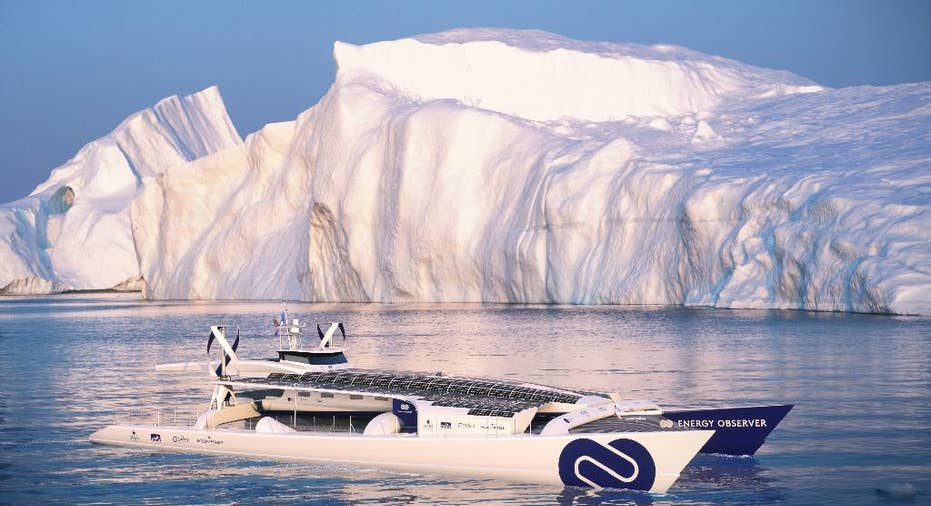Zero-emission boat prepares for round-the-world odyssey

PARIS – The first self-sufficient boat powered only by emission-free energy will start a six-year trip around the world in the spring.
Energy Observer, a former multi-hull race boat converted into a green vessel equipped with solar panels, wind turbines and a hydrogen fuel cell system, will be powered by wind, the sun and self-generated hydrogen.
The 5 million euro ($5.25 million) boat, which is currently in a shipyard in Saint-Malo, will set sail from the Brittany port and will make its first of 101 stops across 50 countries in Paris as part of a six-year circumnavigation.
"This boat will demonstrate that there are many solutions for energetic transition," said French environmentalist Nicolas Hulot, who attended the project presentation on Wednesday at the UNESCO headquarters. "All solutions are within nature."
Designed in 1983 under the supervision of Mike Birch, the boat enjoyed a successful career in open-sea sailing races, including winning the Jules Verne Trophy in 1994, with Peter Blake at the helm. The Energy Observer project was conceived in 2015 by skippers Frederic Dahirel and Victorien Erussard, with scuba diver and filmmaker Jerome Delafosse also behind the project.
"I'm passionate about new technologies," Erussard said. "Building a self-sufficient boat could have seemed utopian, but this is going to be an incredible vessel. It's very promising for the future."
The technology fitted to the 30.5-meter (100-foot) boat, which is also equipped with a kite sail, will enable the production of hydrogen through electrolysis process.
"We bank on the diversity of renewable energies," Essuard said. "And if there is no sun or wind, or at night, we have the option to draw in our hydrogen reservoirs. We will produce this hydrogen in a decarbonized manner through electrolysis of the sea water."
According to Florence Lambert, the director of the CEA Liten research institute which devised the boat's energy system, Energy Observer is a good example of what energy networks will look like in the near future, with its well balanced mix of renewable energies and hydrogen storage system.
"We are not talking about the delirium of an explorer or a scientific," she said, adding that the prospects for hydrogen-powered transport look bright.
Mark Z. Jacobson, an engineering professor at Stanford University who develops roadmaps for countries to convert to 100 percent renewable energies by 2050, proposes that transportation worldwide be transformed into a combination of battery-electric transport and hydrogen fuel cell-battery electric hybrid transport.
"I believe that it is fantastic that a boat powered by hydrogen and electricity will travel the world," he said in written comments to The Associated Press. "It is an important step forward and consistent with this proposed path to 100 percent clean, renewable energy worldwide for all purposes to solve energy security, job creation, air pollution, and climate problems."



















